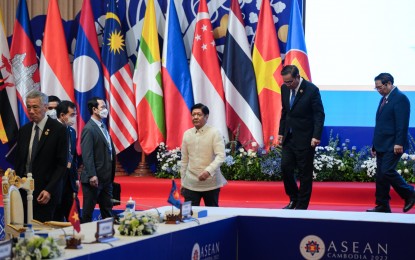
President Ferdinand R. Marcos Jr. (Courtesy of Office of the President)
MANILA – President Ferdinand R. Marcos Jr. expects the economic resilience plans between the Association of Southeast Asian Nations (ASEAN) and Japan to help micro, small, and medium enterprises (MSMEs) cope with the impact of unprecedented economic shocks.
At the 25th ASEAN-Japan Summit in Phnom Penh, Cambodia on Saturday, Marcos stressed the importance of ensuring the continued implementation of the action plan adopted by the 10-man regional bloc and its dialogue partner.
"On the economic aspect, the Philippine leader looks forward to the continued implementation of the ASEAN-Japan Economic Resilience Action Plan, as he underscored the importance of providing assistance and developing the resiliency of micro, small, and medium enterprises," said Undersecretary Cheloy Garafil, Office of the Press Secretary (OPS) officer-in-charge.
Marcos wants to help MSMEs thrive and become resilient, considering that the coronavirus disease 2019 (Covid-19) pandemic has exposed the vulnerability of small businesses, read the OPS Facebook post.
"The President pointed out how the Covid-19 pandemic served as a sharp reminder of how vulnerable micro, small and medium enterprises are," the OP said.
The ASEAN-Japan Economic Resilience Action Plan was adopted in 2020 to enhance cooperation in mitigating the economic challenges driven by the Covid-19 pandemic and ensure long-term economic resilience for ASEAN and Japan’s post-pandemic recovery.
The action plan is comprised of 52 strategic measures aimed at sustaining close economic ties between ASEAN and Japan, mitigating the adverse impact of Covid-19 on the economy, and strengthening both parties' economic resilience.
Marcos also expressed gratitude to Japan for donating USD1 million to Covid-19 ASEAN Response Fund, as well as for supporting the ASEAN Comprehensive Recovery Framework and the ASEAN Coordination Council for Humanitarian Assistance on Disaster Management.
He likewise hoped for Japan's "strong" support and involvement in the programs of the ASEAN Centre for Biodiversity through the establishment and management of ASEAN heritage parks, as part of climate mitigation and adaptation strategy.
Marcos, reiterating the Philippines’ full commitment to uphold regional peace and security, welcomed the Quad’s assurance of unwavering support for ASEAN Unity and Centrality.
Quad is a strategic security dialogue among Australia, India, Japan, and the United States.
Marcos likewise emphasized the need for all concerned parties to ensure that any activity in the region’s waterways adhere to the rule of law, particularly in the 1982 United Nations Convention on the Law of the Sea, to ensure peace, stability, and prosperity.
ASEAN and Japan will mark the 50th commemorative year of their relations in 2023.
Marcos expressed gratitude to Japan for its continued support for the Philippines' disaster management and Covid-19 response, as well as for being home to over 250,000 Filipinos.
“I cannot end my remarks without expressing my appreciation for Japan’s hospitality and protection for over 250,000 Filipinos who now call Japan home,” he said “They have been taken in by the Japanese people and have now found a place to live and work happily. For that we will always be grateful."
On the sidelines of the ASEAN summits on Saturday morning, Marcos and Japanese Prime Minister Fumio Kishida reaffirmed their commitment to further deepen bilateral relations. (PNA)
